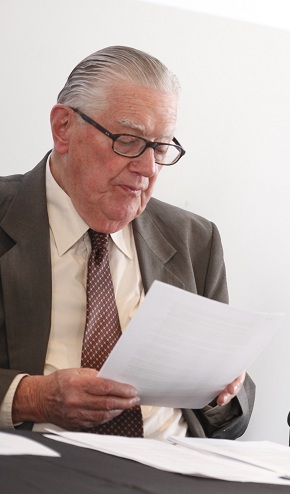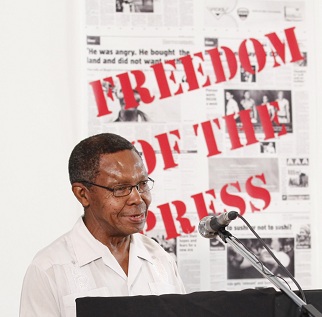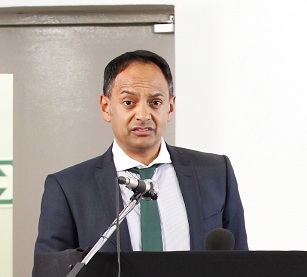Raymond Louw, PCSA Chairperson

Ladies and gentlemen
The Press Council extends a warm welcome to you all. While this is mainly a press conference to enable us to announce the results of our deliberations about the conduct of press self-regulation, it is also an occasion for members of the public to show their interest in the conduct of the press. Indeed, I am gratified that so many of you by your presence are demonstrating your keen interest in the affairs of the press and its role in society.
It is your kind of support that is essential to enable the press to carry out its functions of gathering and publishing news and information, maintaining a watchdog role over government and the private sector, ferreting out corruption, disclosing abuse of public office and mismanagement of the public’s affairs as well as promoting public discussion of the issues that arise.
The public not only wants an informative press but one that it can trust and believe and it is that aspect of press conduct that the Press Council and its officials are concerned with. Their mission is to promote freedom of the press and at the same time advance excellence in the professional and ethical conduct of journalists and media houses.
The current Press Council’s five-year term of office is coming to an end and it has been the practice at this time to review the Press Code, the Complaints Procedures and the council’s Constitution. In the last two years this process has been influenced by the criticism directed at the press by the ruling political party, the African National Congress, and its decision to request parliament to investigate structures to regulate the press such as a Media Appeals Tribunal. The moves by the ANC, in turn, generated heightened interest by the general public in the press. As a result of this increased attention in the affairs of the press, the Press Council embarked on a much more intensive review by setting up a Task Team to interrogate its structures, rules and codes and invited the public in several regions of the country to participate. Meanwhile, the SA National Editors’ Forum and Print Media South Africa set up the Press Freedom Commission headed by retired Chief Justice Pius Langa and composed of nine independent persons who have an interest in the conduct of the media but no journalists were included. They conducted a review of the recommendations of the Task Team and an intensive investigation of their own of regulation mechanisms in South Africa and selected foreign countries. The Task Team’s directive -- will its proposals lead to an improvement in the quality of journalism in South Africa; will it make the system more effective; and is it practical – permeated the whole process of the two inquiries.
Wide public interest was generated and at the public hearings conducted by both investigating teams people, ranging from academics to lawyers, others from other disciplines and members of the public came forward to present their views about the conduct of the press and their suggestions for improvements. At the end of this lengthy process the Press Council reviewed the recommendations and melded those regarded as appropriate into amended versions of the Press Code, Complaints Procedures and the Constitution and these documents were then handed to the constituent press component of the Press Council – Print Media South Africa, the Magazine Publishers’ Association of South Africa, the Association of Independent Publishers, the Forum of Community Journalists and the South African National Editors’ Forum – who were requested to consider the changes and adopt or reject them. Many of the changes were accepted and the final document that emerged is the one that is being put before you today as the Constitution and rules and regulations that will be used to regulate the press.
While the South African press abides by the considered view expressed by the African Union in its ``Statement of Principles on Freedom of Expression’’ adopted in Banjul, Gambia, in 2002, that ``Effective self-regulation is the best system for promoting high standards in the media’’ the Press Council has taken into account the press’s accountability to the public by expanding that concept into an `` independent co-regulatory system involving exclusively representatives of the press and representatives of the public…’. Thus the council will consist of six press representatives and six public representatives and the chairman will be a retired judge recommended by the Chief Justice and chosen by the outgoing Press Council.
Indeed, both the Press Freedom Commission and the Press Council’s Task Team rejected the concept of statutory, or government, regulation of the press through such bodies as media councils or appeals tribunals where the government selects so-called ``independent’’ monitors of the press. This is fully in accord with the position taken by the International Press Institute, the World Press Freedom Committee and the International Federation of Journalists. The South African process is also in accord with the findings in 2007 by the New Zealand Press Council which reviewed the structures of press councils in the democratic world and found that 86% were non-statutory. Indeed, the operations of the SA Press Council are similar to those of many of the councils investigated by the New Zealanders.
Most of those councils have also adopted peer pressure and the publication by offending newspapers of the findings of the council disciplinary structures against them – such as requiring corrections, apologies, etc., to be published with a decreed prominence and positioning in the paper – similar to the practice of the South Africa’s Press Council. This means that South Africa’s Press Council in common with most other press councils has rejected fines or other punitive ``sentences’’ for editorial content. It has, however, introduced fines, suspension or expulsion for publications which display recalcitrant attitudes to council procedures.
Perhaps one of the major issues dealt with was the ``waiver’’ – whereby complainants were required to accept that having chosen the Press Council structures to deal with their complaint they would not take the matter to a court or another tribunal. After much discussion, the council has decided to drop this requirement and recommend to the incoming council to review the outcome of that decision in a year. The objections were that newspapers could now be subject to two disciplinary hearings and that admissions made in a hearing by the council’s Press Ombudsman could be used against the paper in another tribunal or that a newspaper would withhold information from the ombudsman for fear that it would be used against the paper at another tribunal or court hearing.
The discussions during these past two years on many of the issues raised have on occasion been heated and intense, but the majority view has prevailed and the broad view is that the new structures and the fashioning of independent co-regulation will improve editorial standards and maintain constitutional freedom of expression and freedom of the press.
I wish to thank all those who have participated in this exercise. They have given a great deal of time and energy in dealing with the issues that were raised and what I found impressive was their dedication to the principles of press freedom and media excellence when making their decisions during the discussions. In particular, I wish to thank our Press Ombudsman, Joe Thloloe, who conducted the review process with great determination that nothing in our approach should be lacking and who drove himself relentlessly and often far into the night to cope with the demands that the reviews placed on him.
I now have much pleasure in handing over to him to explain the many other changes that we have introduced.
Back to Events Page
Joe Thloloe - Press Ombudsman

Just over a year ago, we met in this precinct to unveil the Press Council’s Review of itself and its operations. On that occasion, I said this place has memories for me: in this very prison, Number Four, I was locked up for refusing to carry a dompas. I was 17 years old then.
I remember the van reversing into that passage at the entrance on March 22, 1960, and spewing us into the arms of hostile prisoners, goaded by the warders. They were intent on beating us up as they did every prisoner who arrived, but when they realised why we were in prison they turned to the warders and told them they couldn’t touch us because we were fighting for them too.
I came back here to Number Four in 1983 and was among the last prisoners in this jail. We were moved to the new Sun City Prison, in Naturena in southern Johannesburg, and were among the first prisoners there. It had a brand new lustre.
There is deep meaning in the transformation that has happened on this hill – from being the dungeons of Number Four to being the beacon that is Constitution Hill.
When we are engrossed in the daily grind of meeting deadlines, trying to put food on our children’s plates, warding off high fuel prices and e-toll fees, when we are caught up in the horrors of Marikana, it is quite easy to forget how much South Africa has achieved in the last 18 years.
A visit to Constitutional Hill places everything in perspective.
It is thus appropriate to unveil the revamped Press Council and its complaints handling mechanism here, where the defenders of our Constitution are based.
The shape of the revamped system is delineated in the new edition of the Press Council booklet, which you will be getting today, fresh from the presses.
It is a booklet divided into two: the first half, up to page 27, is the current system as you have come to know it. The second half are three addenda that are made up of the Press Code, Complaints Procedures and the Constitution that come into effect on January 1, 2013.
It is structured this way to make it easier to navigate the transition.
Ladies and gentlemen, allow me to go through the major differences between the current and what happens on January 1, 2013:
- From "press self-regulation" to "a voluntary independent co-regulatory system involving exclusively representatives of the press and representatives of the public."
- Press Council now going to be chaired by a retired judge and will have six public and six press representatives.
- The deputy chair will be rotated between the press and the public members.
- Personnel in the office will be beefed up: a director, an ombudsman and a public advocate and if necessary their deputies. The public advocate receives the complaints and is the champion of the complainants throughout the process.
- Third party complaints will now be accommodated.
- The public advocate may under some circumstances initiate complaints if it is in the public interest.
- The chair of appeals will now hear an appeal with one press member of the Panel of Adjudicators and up to three public members, with the discretion on the number resting with the chair of appeals.
- Legal representation shall generally not be permitted.
- Recalcitrant publications will be fined, suspended or expelled, but not for content.
- Findings will be handed down within 21 days of a hearing.
- The waiver will be excluded.
The Press Council and the print industry believe that this strengthened system will promote and develop ethical practice in journalism, the primary aim and objective of the Press Council.
From today, the current council has a tight schedule to facilitate the hand-over in January.
Both the current and the new constitution of the Press Council require that the outgoing council should approach the Chief Justice for his recommendations for a retired judge to serve as chairperson of the Appointments Panel.
This has already been done. The current chairperson has already asked Chief Justice Mogoeng Mogoeng to recommend two or three retired judges to serve on the structures of the Press Council. He is considering the request.
While we wait for the recommendations, shortly after today’s event, the media across the country will be carrying adverts for applications for the positions of Director, Ombudsman and Public Advocate. Their deputies will be selected from the next best applicants.
At the same time as these adverts go out, there will be others calling for applications or nominations for public representatives on the council and on the Panel of Adjudicators.
Applications for all the positions will close on October 31.
The chairperson of the Appointments Panel and two public representatives and two press representatives from the current council will draw up a shortlist from the applications and they will then proceed to interview those that are on the shortlist.
The associations that constitute the council – Newspaper Association of SA, the Magazine Publishers Association, the Forum of Community Journalists, the Association of Independent Publishers, and the South African National Editors’ Forum will be asked to nominate their representatives on the council and on the Panel of Adjudicators.
We are aiming to announce the new council, the Director, the Ombudsman, Public Advocate and the members of the Panel of Adjudicators by the first week in December.
It’s a tight schedule, but we rely on the media to reach every South African and excite them sufficiently to want to participate in this project of enhancing the quality of journalism and, therefore, democracy in this country.
Raymond tried to load the praise on my shoulders. I don’t accept that load because the road to where we stand today has been shared with some brilliant and dedicated minds. My personal thanks go to Print Digital Media SA, whose affiliates dug deep into their pockets to bankroll the work towards this revamp, the associations that constitute the Press Council, the Press Council’s Task Team, the members of both the Press Council and the Press Appeals Panel, the members of the Press Freedom Commission, the lawyers who gave unstintingly of their time and advice, the staff in the Ombudsman’s Office, particularly Deputy Ombudsman Johan Retief, who bravely took on more work as I was consumed with this project, the people and organisations that made oral and/or written submissions to the Task Team and the Press Freedom Commission, to all who pulled this event together, and above all, to you present here today for making this event so memorable for me.
If you want to trace the road leading to this makeover please visit our website www.presscouncil.org.za and click on Reports to see the Press Council’s Review and the Press Freedom Commission’s Report.
Back to Events Page
Hoosain Karjieker - President of Print and Digital Media South Africa

One of the most important tasks of the Print and Digital Media SA, is to advocate for and uphold the importance of self regulation in our sector. This is just one of the many strategic issues we are currently grappling with as an industry ‘going through change’.
We understand that what worked effectively yesterday might not be appropriate for tomorrow. At the same time we chose not to wait to make corrective interventions only when problems arise. You will recall that the industry undertook a review process of the Press Council and the Office of the PressOmbud in 2007.
To ensure a culture of sustained excellence it was necessary for the industry to engage in deep dialogue on issues like, ethics within the industry. We had to look at the tangible and intangible risks involved. We agreed that a transformational leadership approach was necessary - this enabled us to be proactive in shaping our future.
Not only did we look internally at our own values as an industry – our own internal compass – we also listened to the concerns that were raised by various stakeholders. This lead us along a journey in which we attempted to deal with all the issues exhaustively on a number of levels. The decisions, albeit them not easy decisions, meant that we chose as an industry to ‘do’ what we say we value…
Once again, we acknowledge the work done by the Press Freedom Commission that resulted in the recommendations that were put forward in the form of the report.
It was an intense process which required brave, ego-free conversations that took into account the synergistic relationship of the two processes – you will recall that the Press Council had already commenced a review process prior to us constituting the Press Freedom Commission.
The fact that we committed ourselves to a series of deliberations and debates on various issues, involving the Press Council, SANEF as well as PDMSA, is symbolic of our commitment to a culture of sustained excellence in our field, and to a system that ought to exist long beyond any one of us.
The acceptance of the recommendations made by the PFC represents a significant shift in the mindset of the stakeholders, and we believe that the new system of independent co-regulation as contained in the Constitution of the Press Council and the Press Code now showcases a system that is dynamic and a robust best practice that could be emulated across the world.
We would therefore like to extend our gratitude to Raymond Louw, the Chairperson of the Press Council, Joe Thloloe, as well as the Members of the Working Committee for their efforts in finally concluding this process.
Back to Events Page